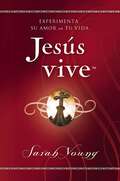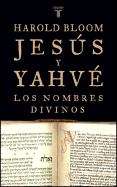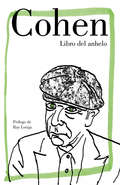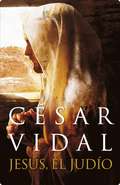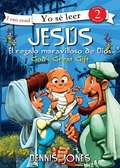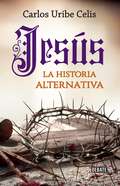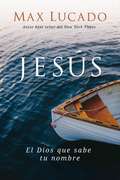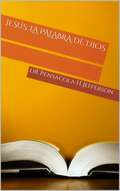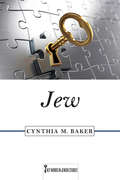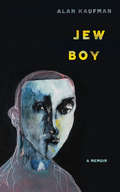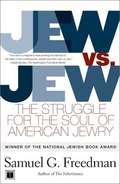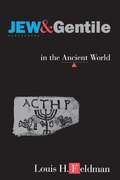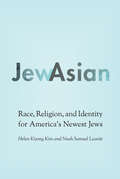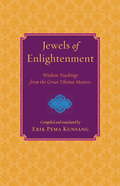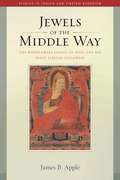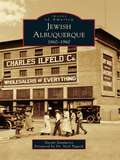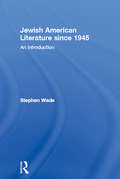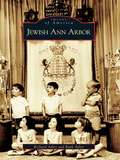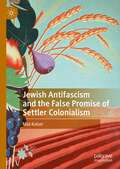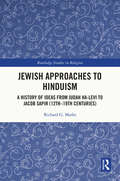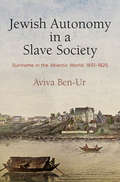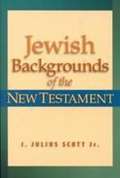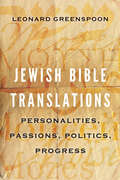- Table View
- List View
Jesús vive: Experimenta (Jesus Lives)
by Sarah YoungEn este libro, 180 devociones temáticas ejemplifican la presencia de Jesús en tu vida. En este viaje, Sarah trae a la luz la verdad contenida en Romanos 8.11: El Espíritu de aquel que levantó de los muertos a Jesús mora en vosotros. Esta promesa toma vida y un nuevo significado a medida que descubras que en verdad ¡Jesús vive!Desde las peticiones más profundas de tu corazón a las alabanzas llenas de gozo, ¡el Rey de reyes vive en cada una de ellas! Conocer a Jesús de una manera más profunda y a nivel personal no solo significa verlo trabajar en tu vida, sino también abrirle tu corazón al Señor.Ya sea que estés luchando en el desierto o cosechando abundantes bendiciones, Jesús está siempre vivo y presente. La pregunta es: ¿lo ves? ¿Reconoces su voz? ¿Sientes su mano ofreciéndote consuelo? ¿Quieres estar en comunión con él? En este libro, 180 devociones temáticas ejemplifican la presencia de Jesús en tu vida.En este viaje, Sarah trae a la luz la verdad contenida en Romanos 8.11: El Espíritu de aquel que levantó de los muertos a Jesús mora en vosotros. Esta promesa toma vida y un nuevo significado a medida que descubras que en verdad ¡Jesús vive!
Jesús y Yahvé. Los nombres divinos
by Harold BloomHarold Bloom ha escrito acerca de la religión y la Biblia a lo largo de toda su carrera, pero ahora, con Jesús y Yahvé, ha logrado su libro más explosivo e importante. Teniendo en cuenta que existen muy pocos testimonios del Jesús histórico, Bloom ha utilizado su inigualable talento para examinar el carácter de Jesús y observar las incoherencias, las contradicciones y los puntos en los que falla la lógica de los Evangelios. También examina el carácter de Yahvé, quien, según Bloom, tiene más rasgos en común con el Jesús de Marcos que con el Dios Padre de la tradición cristiana y de la posterior tradición rabínica. Además, Bloom aduce que la Biblia hebrea de los judíos y el Antiguo Testamento cristiano son libros muy diferentes, con propósitos, tanto religiosos como políticos, muy distintos. Jesús y Yahvé es una lectura emocionante y estimulante, una crítica literaria que cambia el paradigma y que supondrá un desafío e iluminará a judíos y cristianos por igual. En un momento en que la religión ha pasado a ocupar un lugar central en la arena política, la provocadora conclusión de Bloom de que no existe una tradición judeocristiana, de que las dos historias, los dos dioses, e incluso las dos Biblias, no son compatibles, hará que los lectores se replanteen todo lo que hemos dado por sentado acerca de lo que -creíamos- era una herencia compartida. Sin duda, será uno de los libros más discutidos, debatidos y celebrados del año.
Jesús y las mujeres: Una insólita visión del mundo femenino a través de las palabras de Jesús
by Enzo Bianchi«Sería bueno que la Iglesia, todas las iglesias, volvieran a inspirarse sin miedo en las palabras y la actitud de Jesús hacia las mujeres, asumiendo su visión del mundo.»Enzo Bianchi «Levántate, mujer, muestra la frente, quédate firme, no vivas agachada.» <P><P> Cuentan los sabios que todo buen judío, al levantarse por la mañana, daba gracias a su dios por no ser pagano, mujer o esclavo. ¿Cuál era entonces el papel de las mujeres en los tiempos de Jesús? Las vírgenes eran presas codiciadas para el matrimonio, y las casadas gobernaban como dueñas del hogar y maestras de sus hijos, a resguardo de la mirada ajena y al amparo de unas leyes creadas por los hombres. <P><P> A lo largo de los siglos, la Iglesia se ha preocupado por seguir estas reglas y alejar del poder fáctico a la mujer, pero Enzo Bianchi ha repasado con atención algunos textos sagrados para mostrarnos la actitud de Jesús hacia las figuras femeninas que se cruzaron en su vida: mujeres enfermas, extranjeras, adúlteras, que se acercaron y recibieron de él palabras de respeto y aliento. Y, entre ellas, destaca la imagen de María Magdalena, que la Historia con mayúsculas ha tratado de manera extravagante y a menudo perversa, pero que en boca de Jesús fue apóstol de los apóstoles, mujer sabia y poderosa. <P><P>Jesús y las mujeres es un ensayo honesto y polémico que nos acerca a la historia viva de otros tiempos, y sus palabras encuentran eco en nuestra realidad.
Jesús, el judío
by César VidalJesús de Nazaret es un personaje adorado, venerado o admirado por miles de millones de personas. Dios para unos, maestro para otros, lo cierto, sin embargo, es que su figura y sus verdaderas enseñanzas son ignoradas por no pocos de los que afirman seguirlo. Siglos de tergiversación y manipulación han ocultado que Jesús no fue un cristiano ni creció en un medio occidental. Jesús nació, vivió y murió como judío y tanto su persona como su doctrina son imposibles de comprender sin tener en cuenta de manera primordial esa circunstancia.Jesús, el judío constituye un intento sólido, audaz y, sobre todo, extraordinariamente bien documentado de desvelar la realidad histórica de Jesús según se desprende del estudio de las fuentes judías, permitiendo ver quién fue, quién dijo ser, qué enseñó y cuál es su verdadero significado en la historia universal.Obra no apta para fanáticos, sectarios o proclives al escándalo, Jesús, el judío resulta una lectura indispensable para comprender el judaísmo del Segundo Templo, los orígenes del cristianismo y las verdaderas raíces de la cultura en que vivimos.
Jesús, el regalo maravilloso de Dios / Jesus, God's Great Gift
by ZondervanBILINGUE. Todo niño aprende a leer de diferentes maneras y a su propio paso. Los libros de la serie, ¡Yo sé leer!, ayudan a desarrollar su habilidad para leer y su crecimiento spiritual a través de libros basados en historias y valores bíblicos y diferentes niveles de aprendizaje. En, Jesús el gran regalo de dios, cuando Jesús nació, sus padres estaban durmiendo en un establo, pero la gente enseguida supo que el era especial por la estrella que brillaba sobre él. ¿Que pasaría cuando Jesus creciera?
Jesús. la historia alternativa
by Carlos Uribe CelisCon un enfoque crítico-histórico, este libro presenta una historia material y realista de la vida, pasión y muerte de Jesús. La tradición historiográfica conocida como La búsqueda de Jesús ha estado vigente al menos en los últimos tres siglos. Sus fuentes son principalmente la crítica textual: qué dicen y qué omiten los evangelios canónicos; la crítica histórica, es decir qué registraron sobre Jesús los historiadores, políticos y militares de su época; y la arqueología, que permite comprender los contextos y comportamientos en el tiempo en que vivió Jesús y apareció el cristianismo. Sobre esta base, este libro toma partido por varias de estas tesis y hace algunos aportes sobre el estudio del Jesús histórico, muchos de ellos desconocidos para el público general como, por ejemplo, que la familia de Jesús en galilea es adoptiva, que Jesús se entrega él mismo a la autoridad judía y Judas es su agente, y que Jesús no muere en la cruz sino en India.
Jesús: El Dios que sabe tu nombre (Jesus, Spanish Edition)
by Max LucadoEn este trabajo seminal, el amado pastor y autor de gran éxito Max Lucado explora la vida y el carácter de Jesús, ahora con contenido inédito.El Dios del universo sabe tu nombre. Ha caminado por tus calles. Jesús. Quizás hayas oído hablar de él, lo hayas estudiado o le hayas orado. ¿Pero lo conoces? Esta es la pregunta que Max plantea al lector.Dividido en seis secciones (Emmanuel, Amigo, Maestro, Trabajador de milagros, Cordero de Dios, Rey que regresa), cada uno con varios capítulos, este libro no solo describe a la persona de Jesús, sino que también se zambulle en el corazón de Jesús hacia el lector.Al explorar la vida, la muerte y la resurrección de Jesús, así como detalles específicos: como la forma en que interactuó con sus amigos y enemigos, lo que hizo con su tiempo solo, cómo actuó en una fiesta, etc. esta compilación de Max Lucado, ahora con contenido original nunca visto, Max les da a los lectores la oportunidad de familiarizarse con el hombre que está en el centro de la historia más grandiosa jamás contada.Al aprender más acerca de la persona que Jesús fue y es, el lector entenderá más claramente a la persona para la cual fue creado. Max escribe: «No te conformes con una mirada superficial o una comprensión superficial. Mira mucho al corazón de Cristo y lo verás. Gracia y vida. El perdón del pecado. La derrota de la muerte. Esta es la esperanza que él da. Esta es la esperanza que necesitamos».
Jesús: La Palabra de Dios
by DR Pensacola H JeffersonAlgunas de las manifestaciones de Dios son los cielos y ellos HABLAN. Toda la creación, de hecho, hablan de Dios; su bondad, su sabiduría y su poder. El Rey David, el salmista, dice que los cielos HABLAN y CUENTAN la gloria de Dios y la OBRA de la creación. Los cielos CUENTAN sin una sola escritura o palabras humanas, que Dios es infinitamente GRANDIOSO, bueno, y poderoso. Los Cielos Hablan a través del cielo espacioso, las estrellas brillantes o la vasta astronomía, los varios planetas, el sol, la luna. Los cielos desplegados DECLARACION, PREDICAN, CUENTAN que Dios existe. La Creación es un LANGUAJE que habla a todas las naciones y lenguas. La CREACIÓN es un LENGUAJE escrito por las OBRAS del Espíritu Santo y DECLARAN sabiduría, sin escalas, sin una sola palabra humana. Puede ser leído y entendido sin ninguna habilidad lingüística hablada o leída por los humanos. El lenguaje de la Creación está siempre hablando a través de su glorioso cielo, su magnífica tierra, su perpetua fertilidad, su nutritiva vegetación, su comunes y raros animales, sus beneficios múltiples, y sus operaciones sustentables. El autor del lenguaje de la creación es Dios y él HABLA a través de cada OBRA que puede ser VISTO por lo que ha sido HECHO. Como el CREADOR, Dios es descubierto a través de la revelación del conocimiento de un LANGUAJE hablado por su OBRA creativa. Su lenguaje creativo TAMBIÉN es llamado LA PALABRA DE DIOS. La PALABRA de DIOS es una PRUEBA que la creación no ocurrió por casualidad o un big bang, pero que fue CREADO o vino a existencia por un PODER UNICO; ¡Dios mismo!; La CREACIÓN es un LENGUAJE hablado por la PALABRA del Espíritu de Dios. El lenguaje de La CREACIÓN DECLARA sabiduría. Sin embargo, las OBRAS del Espíritu Santo vienen a existencia, PRIMERO, a través de la PALABRA DE DIOS, quien es la sabiduría. La CRE
Jew
by Cynthia M. BakerJew. The word possesses an uncanny power to provoke and unsettle. For millennia, Jew has signified the consummate Other, a persistent fly in the ointment of Western civilization’s grand narratives and cultural projects. Only very recently, however, has Jew been reclaimed as a term of self-identification and pride. With these insights as a point of departure, this book offers a wide-ranging exploration of the key word Jew—a term that lies not only at the heart of Jewish experience, but indeed at the core of Western civilization. Examining scholarly debates about the origins and early meanings of Jew, Cynthia M. Baker interrogates categories like “ethnicity,” “race,” and “religion” that inevitably feature in attempts to define the word. Tracing the term’s evolution, she also illuminates its many contradictions, revealing how Jew has served as a marker of materialism and intellectualism, socialism and capitalism, worldly cosmopolitanism and clannish parochialism, chosen status, and accursed stigma. Baker proceeds to explore the complex challenges that attend the modern appropriation of Jew as a term of self-identification, with forays into Yiddish language and culture, as well as meditations on Jew-as-identity by contemporary public intellectuals. Finally, by tracing the phrase new Jews through a range of contexts—including the early Zionist movement, current debates about Muslim immigration to Europe, and recent sociological studies in the United States—the book provides a glimpse of what the word Jew is coming to mean in an era of Internet cultures, genetic sequencing, precarious nationalisms, and proliferating identities.
Jew Boy: A Memoir
by Alan KaufmanJew Boy is Alan Kaufman's riveting memoir of being raised by a Jewish mother who survived the Holocaust. This pioneering masterpiece, the very first memoir of its kind by a member of the Second Generation is Kaufman's coming-of-age account, by turns hilarious and terrifying, written with irreverent humor and poetic introspection. Throughout the course of his memoir, Kaufman touches on the pain, guilt, and confusion that shape the lives and characters of American-born children of Holocaust survivors. Kaufman struggles to comprehend what it means to be Jewish as he deals with the demons haunting his mother and attempts to escape his wretched home life by devoting himself to high school football. He eventually hitchhikes across the country, coming face-to-face with the phantoms he fled. Taking us from the streets of the Bronx to the highways of America, the kibbutzim and Israeli army to personal rebirth in San Francisco, and finally to a final reckoning in Germany, Jew Boy shines with the universal humanity of a brilliant writer embracing the gift of life. Kaufman's fierce passion will leave no reader untouched.
Jew Vs. Jew: The Struggle for the Soul of American Jewry
by Samuel G. FreedmanAt a time when American Jews should feel more secure and cohesive than ever, civil war is tearing apart their community. Congregations, neighborhoods, even families are taking sides in battles about Jewish identity and Jewish authenticity.
Jew and Gentile in the Ancient World: Attitudes and Interactions from Alexander to Justinian
by Louis H. FeldmanRelations between Jews and non-Jews in the Hellenistic-Roman period were marked by suspicion and hate, maintain most studies of that topic. But if such conjectures are true, asks Louis Feldman, how did Jews succeed in winning so many adherents, whether full-fledged proselytes or "sympathizers" who adopted one or more Jewish practices? Systematically evaluating attitudes toward Jews from the time of Alexander the Great to the fifth century A.D., Feldman finds that Judaism elicited strongly positive and not merely unfavorable responses from the non-Jewish population. Jews were a vigorous presence in the ancient world, and Judaism was strengthened substantially by the development of the Talmud. Although Jews in the Diaspora were deeply Hellenized, those who remained in Israel were able to resist the cultural inroads of Hellenism and even to initiate intellectual counterattacks. Feldman draws on a wide variety of material, from Philo, Josephus, and other Graeco-Jewish writers through the Apocrypha, the Pseudepigrapha, the Church Councils, Church Fathers, and imperial decrees to Talmudic and Midrashic writings and inscriptions and papyri. What emerges is a rich description of a long era to which conceptions of Jewish history as uninterrupted weakness and suffering do not apply.
JewAsian: Race, Religion, and Identity for America's Newest Jews (Studies of Jews in Society)
by Helen Kiyong Kim Noah Samuel LeavittIn 2010 approximately 15 percent of all new marriages in the United States were between spouses of different racial, ethnic, or religious backgrounds, raising increasingly relevant questions regarding the multicultural identities of new spouses and their offspring. But while new census categories and a growing body of statistics provide data, they tell us little about the inner workings of day-to-day life for such couples and their children.JewAsian is a qualitative examination of the intersection of race, religion, and ethnicity in the increasing number of households that are Jewish American and Asian American. Helen Kiyong Kim and Noah Samuel Leavitt’s book explores the larger social dimensions of intermarriages to explain how these particular unions reflect not only the identity of married individuals but also the communities to which they belong. Using in-depth interviews with couples and the children of Jewish American and Asian American marriages, Kim and Leavitt’s research sheds much-needed light on the everyday lives of these partnerships and how their children negotiate their own identities in the twenty-first century.
Jewels of Enlightenment: Wisdom Teachings from the Great Tibetan Masters
by Erik Pema KunsangDelve into Tibet's rich religious heritage with this compilation of Buddhist prayers, poems, and teachings from all the various schools. A perfect companion for meditation and contemplation, Jewels of Enlightenment represents over a millennium of wisdom from masters such as Milarepa, Gampopa, Machig Labdrön, Jigmey Lingpa, Shabkar, Jamgön Kongtrül, and more on how to live a meaningful life.
Jewels of the Middle Way: The Madhyamaka Legacy of Atisa and His Early Tibetan Followers (Studies in Indian and Tibetan Buddhism #22)
by James B. AppleJewels of the Middle Way documents an important tradition of Madhyamaka and provides insight into both the late Indian Buddhist blend of Madhyamaka and tantra and the Kadampa school founded by the Indian Buddhist master Atisa.This book presents a detailed contextualization of the Madhyamaka (Middle Way) school in India and Tibet, along with translations of several texts in the Bka’ gdams gsung ’bum (Collected Works of the Kadampas), recently recovered Tibetan manuscripts that are attributed to Atisa and Kadampa commentators. These translations cohere around Atisa’s Madhyamaka view of the two realities and his understanding of the practice and the nature of the awakening mind. The book is organized in three parts based on the chronology of Atisa’s teaching of Madhyamaka in India and Tibet: (1) Lineage Masters, the Mind of Awakening, and the Middle Way; (2) Articulating the Two Realities; and (3) How Madhyamikas Meditate. Each part focuses on a specific text, or set of texts, specifically related to Atisa’s Middle Way. The authorship and date of composition for each work is discussed along with an outline of the work’s textual sources followed by an analysis of the content.
Jewish Albuquerque: 1860-1960 (Images of America)
by Dr Noel Pugach Naomi SandweissAlbuquerque, founded by Spanish colonists in 1706, seems an unusual place for Jewish immigrants to settle. Yet long before New Mexico statehood in 1912, Jewish settlers had made their homes in the high desert town, located on the banks of the Rio Grande River. Initially, business opportunities lured German Jews to the Santa Fe Trail; during the expansive railroad days of the 1880s, Jewish citizens were poised to take on leadership roles in business, government, and community life. Henry Jaffa, a Jewish merchant and acquaintance of Wyatt Earp, served as Albuquerque's first mayor. From launching businesses along Central Avenue, to establishing the Indian Trading Room at the famed Alvarado Hotel and founding trading posts, Route 66 tourist establishments, and the Sandia Tram, Jewish businesspeople partnered with their neighbors to boost Albuquerque's already plentiful assets. Along the way, community members built Jewish organizations--a B'nai B'rith chapter, Congregation Albert, and Congregation B'nai Israel--that made their mark upon the larger Albuquerque community.
Jewish American Literature since 1945: An Introduction (Baas Paperbacks Ser.)
by Stephen WadeFirst published in 1999. Routledge is an imprint of Taylor & Francis, an informa company.
Jewish Americans (Our Cultural Heritage)
by Pam RosenbergA culture and tradition both ancient and modern, the stories and history of Jewish Americans go to the very heart of what it means to be an American. Students will learn about the struggles of the past and the faith of a people who made their way to America in the hopes of finding a better life.
Jewish Ann Arbor (Images of America)
by Richard Adler Ruth AdlerThe earliest Jewish settlers arrived in Michigan during the mid-18th century. Primarily traders associated with the burgeoning fur industry, few of these entrepreneurs remained permanently. During the early 1840s, the five Weilbrothers, farmers and tanners from Germany, became the first prominent Jewish settlers in Washtenaw County. By the end of that decade, a Jewish cemetery was established on what is now the site of the Horace Rackham Building on the University of Michigan campus. Though the Weil familyeventually moved west, the cemetery remained as a marker for what was then a miniscule Jewish presence. In the early 20th century, Osias Zwerdling and the Lansky family arrived. In addition to reestablishing a Jewish presence in Ann Arbor, they helped form what became Beth Israel Congregation. Growth of the Ann Arbor Jewish community coincided with the evolution of the university, as well as the city. By the end of the 20th century, a vibrant community representing all facets of Judaism had been established.
Jewish Antifascism and the False Promise of Settler Colonialism
by Max KaiserThis book takes a timely look at histories of radical Jewish movements, their modes of Holocaust memorialisation, and their relationships with broader anti-colonial and anti-racist struggles. Its primary focus is Australia, where Jewish antifascism was a major political and cultural force in Jewish communities in the 1940s and early 1950s. This cultural and intellectual history of Jewish antifascism utilises a transnational lens to provide an exploration of a Jewish antifascist ideology that took hold in the middle of the twentieth century across Jewish communities worldwide. It argues that Jewish antifascism offered an alternate path for Jewish politics that was foreclosed by mutually reinforcing ideologies of settler colonialism, both in Palestine and Australia.
Jewish Approaches to Hinduism: A History of Ideas from Judah Ha-Levi to Jacob Sapir (12th–19th centuries) (Routledge Studies in Religion)
by Richard G. MarksThis book explores past expressions of the Jewish interest in Hinduism in order to learn what Hinduism has meant to Jews living mainly in the 12th through the 19th centuries. India and Hinduism, though never at the center of Jewish thought, claim a place in its history, in the picture Jews held of the wider world, of other religions and other human beings. Each chapter focuses on a specific author or text and examines the literary context as well as the cultural context, within and outside Jewish society, that provided images and ideas about India and its religions. Overall the volume constructs a history of ideas that changed over time with different writers in different settings. It will be especially relevant to scholars interested in Jewish thought, comparative religion, interreligious dialogue, and intellectual history.
Jewish Autonomy in a Slave Society: Suriname in the Atlantic World, 1651-1825 (The Early Modern Americas)
by Aviva Ben-UrA fascinating portrait of Jewish life in Suriname from the 17th to 19th centuriesJewish Autonomy in a Slave Society explores the political and social history of the Jews of Suriname, a Dutch colony on the South American mainland just north of Brazil. Suriname was home to the most privileged Jewish community in the Americas where Jews, most of Iberian origin, enjoyed religious liberty, were judged by their own tribunal, could enter any trade, owned plantations and slaves, and even had a say in colonial governance.Aviva Ben-Ur sets the story of Suriname's Jews in the larger context of Atlantic slavery and colonialism and argues that, like other frontier settlements, they achieved and maintained their autonomy through continual negotiation with the colonial government. Drawing on sources in Dutch, English, French, Hebrew, Portuguese, and Spanish, Ben-Ur shows how, from their first permanent settlement in the 1660s to the abolition of their communal autonomy in 1825, Suriname Jews enjoyed virtually the same standing as the ruling white Protestants, with whom they interacted regularly. She also examines the nature of Jewish interactions with enslaved and free people of African descent in the colony. Jews admitted both groups into their community, and Ben-Ur illuminates the ways in which these converts and their descendants experienced Jewishness and autonomy. Lastly, she compares the Jewish settlement with other frontier communities in Suriname, most notably those of Indians and Maroons, to measure the success of their negotiations with the government for communal autonomy. The Jewish experience in Suriname was marked by unparalleled autonomy that nevertheless developed in one of the largest slave colonies in the New World.
Jewish Backgrounds of the New Testament
by Jr. J. Julius ScottThis survey of intertestamental Judaism illuminates the customs and controversies that provide essential background for understanding the New Testament. Scott opens a door into the Jewish world and literature leading up to the development of Christianity. He also offers an accessible overview of the data through helpful charts, maps, and diagrams incorporated throughout the text to engage his readers.
Jewish Bible Translations: Personalities, Passions, Politics, Progress
by Leonard GreenspoonJewish Bible Translations is the first book to examine Jewish Bible translations from the third century BCE to our day. It is an overdue corrective of an important story that has been regularly omitted or downgraded in other histories of Bible translation. Examining a wide range of translations over twenty-four centuries, Leonard Greenspoon delves into the historical, cultural, linguistic, and religious contexts of versions in eleven languages: Arabic, Aramaic, English, French, German, Greek, Hungarian, Italian, Russian, Spanish, and Yiddish. He profiles many Jewish translators, among them Buber, Hirsch, Kaplan, Leeser, Luzzatto, Mendelssohn, Orlinsky, and Saadiah Gaon, framing their aspirations within the Jewish and larger milieus in which they worked. Greenspoon differentiates their principles, styles, and techniques—for example, their choice to emphasize either literal reflections of the Hebrew or distinctive elements of the vernacular language—and their underlying rationales. As he highlights distinctive features of Jewish Bible translations, he offers new insights regarding their shared characteristics and their limits. Additionally, Greenspoon shows how profoundly Jewish translators and interpreters influenced the style and diction of the King James Bible. Accessible and authoritative for all from beginners to scholars, Jewish Bible Translations enables readers to make their own informed evaluations of individual translations and to holistically assess Bible translation within Judaism.
Jewish Bioethics
by Yechiel Michael BarilanThis book presents the discourse in Jewish law and rabbinic literature on bioethical issues, highlighting practical problems in their socio-historical contexts. Yechiel Michael Barilan discusses end-of-life care, abortion, infertility treatments, the brain death debate, and the organ market. Barilan also presents the theology and spirituality of Jewish medical law, the communal responsibility for healthcare, and the charitable sick-care societies that flourished in the Jewish communities until the beginning of the twentieth century.
